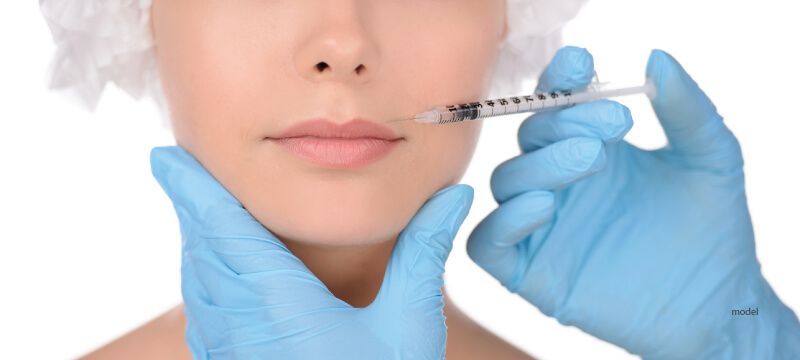Prevent Bruising After Botox and Dermal Fillers With These Tips

Originally published on September 7, 2018. Updated on October 8, 2021 with additional information.
Injectable treatments like Botox and dermal fillers have become incredibly popular as they have the ability to treat symptoms of facial aging without the pain and necessary recovery time of cosmetic surgery. Injectables, however, do sometimes come with one negative side effect: bruising (or swelling) around the injection site.
In one study, nearly 24% of all injectable patients experienced some degree of bruising post-treatment. Fortunately, most post-treatment bruising is minor and resolves on its own within a day or two. There are also simple things patients can do to decrease the likelihood (and intensity) of bruising.
Learn what causes bruises and how to prevent or minimize them by following a few simple tips. Plus, understand when your bruise is a sign you should contact your doctor.
Why Can Bruising Occur After Botox or Fillers?
Bruising doesn’t always occur after Botox or dermal fillers, but any time an injection is made under the skin, bruising is possible. Black, red or purple bruises form when damaged blood vessels leak blood into the surrounding tissue. This can occur if a blood vessel is nicked by a needle, or if skin is pinched or pulled, causing capillary damage.
While a skilled injector can minimize bruising, there is now way to guarantee bruising will not occur post-injection. Some people simply bruise more than others, especially in areas that lack collagen, a structural protein that supports blood vessels and protects them from injury.
Who Is Most Likely to Bruise After Botox or Fillers?
Genetics play a role in likelihood of bruising. Women are more likely to bruise than men, and older people are more likely to bruise than those who are younger. In addition, the following avoidable factors may increase your risk of bruising:
- Use of blood thinners, including aspirin and NSAIDs
- Frequent use of alcohol, which increases blood flow
- Exercising immediately before or after treatment
- Systemic inflammation due to poor diet or poor health
Experienced injectors take care to reduce blood vessel damage, but even small needles and numbing, skin tightening creams can’t completely eliminate the risk.
How Long Does Bruising Last After Injectables?
Bruising can appear immediately after your injections, or 1-2 days later. In either case, bruising usually resolves itself after a few days. In some cases, bruises may last up to one week.
Bruises generally begin as dark purple or red, then may turn yellow before disappearing completely. However, it’s important for prospective patients to understand that their experience can differ from other patients as everyone heals at their own pace.
Most bruising that results from a Botox or dermal filler treatment can be easily covered up (hidden) with simple concealer. Here’s a great YouTube makeup tutorial on addressing bruising.
Bruising Prevention: Before your Treatment
Planning ahead can decrease your chances of post-injection bruising! Here are some simple ways to minimize any bruising after a Botox or filler treatment:
Choose the right injectable
Certain injectables are more likely to cause bruising than others. For example, hyaluronic fillers like Juvederm and Restylane have an increased risk of causing post treatment bruising as they are more viscous and are often injected deeper into the skin. In contrast, Botox and other neurotoxins cause less bruising as they typically do not penetrate the skin as deeply.
It’s always a good idea to talk to your dermatologist or injector about your concerns. They may be able to recommend injectables that have the lowest propensity for causing post-treatment bruising.
Choose the right injector
As with any professional cosmetic treatment, choosing the right provider is critical. An expert injector will have years of experience using a multitude of injectables. This experience often helps them to develop a sound injection technique that can minimize post-treatment bruising. Choose an injector who is properly credentialed and listed as a qualified provider by the manufacturer of the injectable. If not a physician, be sure that the injector you choose is supervised by a physician.
Avoid blood thinning medications and supplements
Most injectors will advise their patients to cease taking any medication or supplements that cause thinning of the blood or restrict the blood’s ability to properly clot (two factors that can increase the likelihood of bruising). Note: Patients with pre-existing medical conditions that require the use of anticoagulants should always discuss injectables with the doctors before undergoing treatment.
To prevent bruising, patients should discontinue using the following:
- NSAIDs such as Aspirin, Ibuprofen, and Naproxen
- Anticoagulants like Heparin or Warfarin
- St John’s Wort
- Vitamin E
- Fish Oil/Omega-3 fatty acids
- Gingko Biloba
- Ginseng
- Green tea
- Krill oil
- Flaxseed oils
Bruising Prevention: After your Treatment
Take Arnica Montana
After your filler or Botox treatment consider taking Arnica Montana, a natural remedy with the power to reduce post-procedure pain and treat bruising. Arnica Montana can either be taken in pill form or topically applied to the treatment area. Some injectors may even recommend taking the supplement a few days before your injectable treatment to further prevent bruising.
Eat Pineapple
There’s some evidence that enzymes found in high citrus fruits like pineapples can work to prevent bruising. Try eating pineapple during the first two days after Botox or filler treatment.
Avoid Excess Physical Activity
Intense exercise increases heart rate and blood flow, which increases the risk of bruising. Avoid any form of strenuous physical activity, including weight training and aerobic exercises, for 2-3 days following your injectable treatment. Rigorous activity can increase your heart rate and blood flow, which prevents damaged capillaries at the injection site from quickly healing.
Elevated Sleeping
Avoid sleeping for at least 3-4 hours following your treatment in order to avoid any inadvertent rubbing or pressing on the treatment area. On the first night following your treatment, sleep with your head elevated by propping it up with extra pillow(s).
Avoid Touching
Try your best not to touch the treatment area for at least the first 6 hours after the injection. Specifically, patients should avoid putting any pressure on the injection area as that can cause added trauma to the blood vessels (resulting in further bruising). Never massage the treated area unless specifically instructed to do so by your provider.
Cold Compress
The intermittent use of a cold compress or cold packs within the first 8 hours of treatment can help reduce bruising or swelling in the injection area. The compress can be lightly applied for 5-10 minutes every hour.
Avoid Alcohol
Alcohol relaxes and expands blood vessels, increasing blood flow and the risk of bruising. Even small amounts can trigger this effect. For best results, avoid alcohol completely 1-2 days before and after your injections.
Take Vitamin C
Vitamin C deficiency may increase the likelihood of bruising after injectables. Taking Vitamin C supplements or eating foods high in Vitamin C, such as citrus, strawberries, kale or broccoli can reduce bruising.
Can Bruising a Sign of Something Worse?
Bruising is a completely normal side effect of injectable cosmetic treatments. In rare cases, bruises are a sign that something’s wrong. If any of the following occurs, contact your doctor immediately:
- If your bruise is getting darker or larger
- If a bruise fails to heal completely after 2 weeks
- If your bruises are accompanied by severe pain
More Great Tips:
- 6 Ways To Make Botox & Fillers Last Longer
- Botox vs. Dermal Fillers
- Tips: Recovering From Injectable Treatments

Great post. I was wondering if you are a person who bruises easily is it pretty much guaranteed that you will have bruising from getting Botox or fillers?
Hi Karen,
Thanks for reading our post and submitting your great question. Unfortunately patients who are normally more prone to bruising may experience more bruising from the procedure. However in most cases bruising resolves fairly quickly and can even be covered with makeup (until fully healed). Also skilled injectors should be able to perform the procedure to mitigate bruising as much as possible.
We hope that helps!
Thanks,
WD Staff
This is some really good information about getting injections and preventing bruising. I liked that you pointed out that avoiding touching the injection pointed can help prevent bruising. That is good to know!
Thanks LELA a lot of great tips there, I am scheduled for dermal fillers later this month and when I talked to a few people who had, had it done they mentioned the bruising. Now with a little help from you advise I may be able to reduce the chances of it. Thanks
t is really interesting that doing something simple like eating more citrus could help prevent bruising. thanks for the great tips
I was not aware that the enzymes found in fruits like pineapples can work to prevent bruising!
I had no idea that you should refrain from exercising for a few days after getting Botox injections. Very interesting, thanks for that info
Hi, I had dermal fillers in my cheeks by a very experienced provider. It has now been 12 days and I still have two small bruises on my cheek (not that noticeable) I stopped taking all of the above meds and supplements as requested and did use arnica for a couple of days. Any thoughts?
Hi Athena,
Sorry to hear about the issue, it could simply be how your skin reacts to treatment. Some degree of bruising within 2 weeks of treatment is possible. However, you definitely should contact your injector if it does not resolve after a couple more days.
We hope that helps!
Thanks,
WD Staff